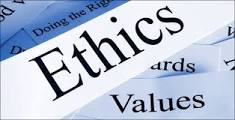March is Ethics Month fellow CPCUs. We learn by sharing information and examples. I hope that these scenarios help stretch your mind when it comes to ethics and the use of data.
Ethics, by definition, considers if behavior is good or bad; moral.[1] Is it ethical to use data from any source? What a loaded question! An important element is to consider the ownership of the data.[2] Let’s consider two views; personally collected data versus publicly collected data.
Personally Collected Data
Possession is nine tenths of the law. This is a common general statement that has been repeated over the years. I collect something, I own it and I will use it in whatever manner I choose. This may work for some items, like purchasing a kitchen appliance from an online seller, but when it comes to data don’t be so quick to decide.
As an online retailer a seller may track customer activity; recording items purchased, returning site visits, typical spend and the shipping address. The seller owns this information and decides to market the data to other online retailers. What might the consumer impact be from use of their data?
If you are using secure methods for data collection and processing, then learning from the data may provide a positive result. Shandrow recommends ten steps to the use of customer data that may assist in preventing bad data behavior results; whether accidental or intentional.[3] Today, making purchases from a retailer typically includes a request for your email. On occasion, the use of the email is to provide offers yet many of these offers are just spam on sales and not items that one would have any interest in purchasing. An effective consideration may be in using the data to benefit both parties; will the customer be left with a positive experience or marketed beyond belief.
Publicly Collected Data
Data is collected and shared in a public source. Is this data fair game for use? If someone sets down a personal item and turns their back for a moment is that a public item now that I can take and use however I want? Don’t be quick to say yes.
There are many data resources that are considered public; such as government related sites or social media platforms. When the data is public it does not automatically mean that one can use and share the raw data themselves. Using the data and gaining some informational insight could be just fine. What about your ethical responsibility if the data contains something personal?
Leetaru made a comparison of the standard of privacy for health related data points along with individual identities; then comments about the lower privacy standard for data collected through social media.[4] What if these were the same use, a psychological profile. If it is not acceptable to use personally identifiable information from the healthcare realm, ethically it may be considered at the same need for protection of data for a like healthcare level of information regardless of the data collection point.
The Ethical Result
There is not always a simple yes or no answer. In these data examples, it is not just a legal question but an ethical question. I might own the data or have legally obtained access, but my right to use the data might be severally limited…or non-existent from an ethical point of view. Data ownership may not be enough, even the use of a non disclosure agreement (NDA) may not satisfy the privilege to use data.2 The discerning question might be should I use the data even if it is legal? Just because I own the data with personal information does not make it ethical to use this data. There are no simple responses for either scenario. We need to assess the situation and ask the hard questions, then make the ethical choice.
Endnotes
[1]Merriam-Webster Dictionary, https://www.merriam-webster.com/dictionary/ethics. (accessed March 15, 2019).
[2] Northern Illinois University. “Data Ownership”, https://ori.hhs.gov/education/products/n_illinois_u/datamanagement/dotopic.html. (accessed March 15, 2019).
[3] Kim Lachance Shandrow, “10 Questions to Ask When Collecting Customer Data”. https://www.entrepreneur.com/article/231513. (accessed March 15, 2019).
[4] Kalev Leetaru,”Should Open Access and Open Data Come With Open Ethics?” Forbes, July 20, 2017. https://www.forbes.com/sites/kalevleetaru/2017/07/20/should-open-access-and-open-data-come-with-open-ethics/#76ee79165426. (accessed March 15, 2019).
